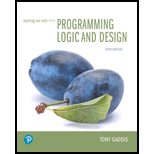
Starting Out with Programming Logic and Design (5th Edition) (What's New in Computer Science)
5th Edition
ISBN: 9780134801155
Author: Tony Gaddis
Publisher: PEARSON
expand_more
expand_more
format_list_bulleted
Question
Chapter 9, Problem 4TF
Program Plan Intro
Sequential search:
- Sequential search is a process of searching for a particular element that is present in the array on by one till the last element until the search element is found.
- The search uses loop that iterates from the beginning till the last element to find the search element.
- The search continues for all the elements present in the array until the last element.
- The search of the target element is made after comparing with the each and every element that is present in the array.
Expert Solution & Answer
Trending nowThis is a popular solution!

Students have asked these similar questions
Find the voltage V0 across the 4K resistor using the mesh method or nodal analysis. Note: I have already simulated it and the value it should give is -1.714V
Resolver por superposicion
Describe three (3) Multiplexing techniques common for fiber optic links
Chapter 9 Solutions
Starting Out with Programming Logic and Design (5th Edition) (What's New in Computer Science)
Ch. 9.3 - Which of the sorting algorithms discussed makes...Ch. 9.3 - Prob. 9.2CPCh. 9.3 - Prob. 9.3CPCh. 9.4 - Prob. 9.4CPCh. 9.4 - On average, with an array of 1,000 elements, how...Ch. 9.4 - Prob. 9.6CPCh. 9 - Prob. 1MCCh. 9 - Prob. 2MCCh. 9 - Prob. 3MCCh. 9 - Prob. 4MC
Ch. 9 - Prob. 5MCCh. 9 - Prob. 6MCCh. 9 - Prob. 7MCCh. 9 - Prob. 8MCCh. 9 - Prob. 9MCCh. 9 - Prob. 10MCCh. 9 - Prob. 1TFCh. 9 - Prob. 2TFCh. 9 - Prob. 3TFCh. 9 - Prob. 4TFCh. 9 - Prob. 5TFCh. 9 - Prob. 1AWCh. 9 - Prob. 2AWCh. 9 - Prob. 3AWCh. 9 - What algorithm does the following pseudocode...Ch. 9 - Prob. 1SACh. 9 - Prob. 2SACh. 9 - Prob. 3SACh. 9 - Prob. 4SACh. 9 - Prob. 5SACh. 9 - Why is the selection sort more efficient than the...Ch. 9 - Prob. 7SACh. 9 - Prob. 8SACh. 9 - Assume the following main module is in a program...Ch. 9 - Prob. 1PECh. 9 - Sorted Names Design a program that allows the user...Ch. 9 - Rainfall Program Modification Recall that...Ch. 9 - Name Search Modify the Sorted Names program that...Ch. 9 - Charge Account Validation Recall that Programming...Ch. 9 - Prob. 7PECh. 9 - Sorting Benchmarks Modify the modules presented in...
Knowledge Booster
Similar questions
- Could you help me to know features of the following concepts: - commercial CA - memory integrity - WMI filterarrow_forwardBriefly describe the issues involved in using ATM technology in Local Area Networksarrow_forwardFor this question you will perform two levels of quicksort on an array containing these numbers: 59 41 61 73 43 57 50 13 96 88 42 77 27 95 32 89 In the first blank, enter the array contents after the top level partition. In the second blank, enter the array contents after one more partition of the left-hand subarray resulting from the first partition. In the third blank, enter the array contents after one more partition of the right-hand subarray resulting from the first partition. Print the numbers with a single space between them. Use the algorithm we covered in class, in which the first element of the subarray is the partition value. Question 1 options: Blank # 1 Blank # 2 Blank # 3arrow_forward
- 1. Transform the E-R diagram into a set of relations. Country_of Agent ID Agent H Holds Is_Reponsible_for Consignment Number $ Value May Contain Consignment Transports Container Destination Ф R Goes Off Container Number Size Vessel Voyage Registry Vessel ID Voyage_ID Tonnagearrow_forwardI want to solve 13.2 using matlab please helparrow_forwarda) Show a possible trace of the OSPF algorithm for computing the routing table in Router 2 forthis network.b) Show the messages used by RIP to compute routing tables.arrow_forward
- using r language to answer question 4 Question 4: Obtain a 95% standard normal bootstrap confidence interval, a 95% basic bootstrap confidence interval, and a percentile confidence interval for the ρb12 in Question 3.arrow_forwardusing r language to answer question 4. Question 4: Obtain a 95% standard normal bootstrap confidence interval, a 95% basic bootstrap confidence interval, and a percentile confidence interval for the ρb12 in Question 3.arrow_forwardusing r languagearrow_forward
- using r languagearrow_forwardusing r language Obtain a bootstrap t confidence interval estimate for the correlation statistic in Example 8.2 (law data in bootstrap).arrow_forwardusing r language Compute a jackknife estimate of the bias and the standard error of the correlation statistic in Example 8.2.arrow_forward
arrow_back_ios
SEE MORE QUESTIONS
arrow_forward_ios
Recommended textbooks for you
- Programming Logic & Design ComprehensiveComputer ScienceISBN:9781337669405Author:FARRELLPublisher:Cengage
 EBK JAVA PROGRAMMINGComputer ScienceISBN:9781337671385Author:FARRELLPublisher:CENGAGE LEARNING - CONSIGNMENT
EBK JAVA PROGRAMMINGComputer ScienceISBN:9781337671385Author:FARRELLPublisher:CENGAGE LEARNING - CONSIGNMENT C++ Programming: From Problem Analysis to Program...Computer ScienceISBN:9781337102087Author:D. S. MalikPublisher:Cengage Learning
C++ Programming: From Problem Analysis to Program...Computer ScienceISBN:9781337102087Author:D. S. MalikPublisher:Cengage Learning  Microsoft Visual C#Computer ScienceISBN:9781337102100Author:Joyce, Farrell.Publisher:Cengage Learning,
Microsoft Visual C#Computer ScienceISBN:9781337102100Author:Joyce, Farrell.Publisher:Cengage Learning, Systems ArchitectureComputer ScienceISBN:9781305080195Author:Stephen D. BurdPublisher:Cengage Learning
Systems ArchitectureComputer ScienceISBN:9781305080195Author:Stephen D. BurdPublisher:Cengage Learning C++ for Engineers and ScientistsComputer ScienceISBN:9781133187844Author:Bronson, Gary J.Publisher:Course Technology Ptr
C++ for Engineers and ScientistsComputer ScienceISBN:9781133187844Author:Bronson, Gary J.Publisher:Course Technology Ptr

Programming Logic & Design Comprehensive
Computer Science
ISBN:9781337669405
Author:FARRELL
Publisher:Cengage

EBK JAVA PROGRAMMING
Computer Science
ISBN:9781337671385
Author:FARRELL
Publisher:CENGAGE LEARNING - CONSIGNMENT

C++ Programming: From Problem Analysis to Program...
Computer Science
ISBN:9781337102087
Author:D. S. Malik
Publisher:Cengage Learning

Microsoft Visual C#
Computer Science
ISBN:9781337102100
Author:Joyce, Farrell.
Publisher:Cengage Learning,

Systems Architecture
Computer Science
ISBN:9781305080195
Author:Stephen D. Burd
Publisher:Cengage Learning

C++ for Engineers and Scientists
Computer Science
ISBN:9781133187844
Author:Bronson, Gary J.
Publisher:Course Technology Ptr